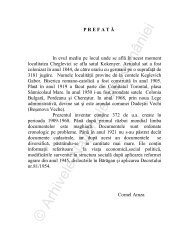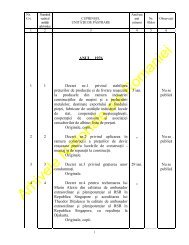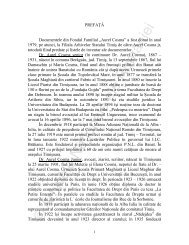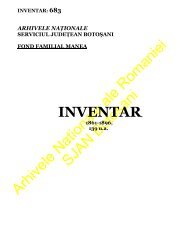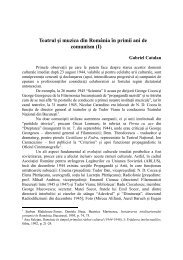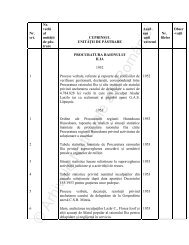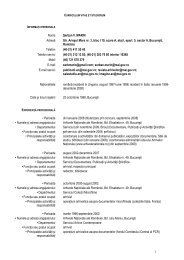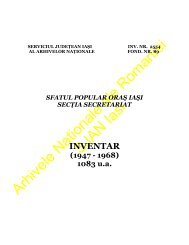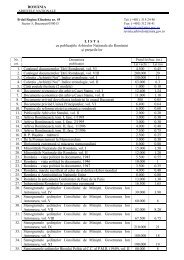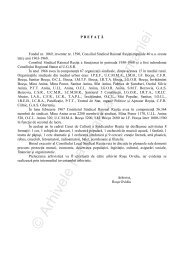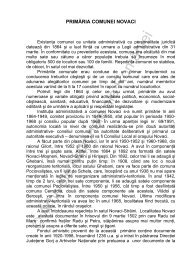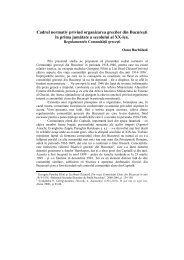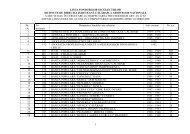Bogdan Popovici - Arhivele Naţionale ale României
Bogdan Popovici - Arhivele Naţionale ale României
Bogdan Popovici - Arhivele Naţionale ale României
You also want an ePaper? Increase the reach of your titles
YUMPU automatically turns print PDFs into web optimized ePapers that Google loves.
B.-F. <strong>Popovici</strong>, Datele person<strong>ale</strong> şi accesul la arhive<br />
Dintotdeauna, obligaţia arhivistului a fost aceea de a prezerva, în vederea<br />
transmiterii pentru viitor, a actelor/documentelor care au reprezentat o mărturie a<br />
faptelor trecute/prezente, servind astfel memoriei societăţii în care activau. Scopurile<br />
păstrării documentelor sunt, aşadar, fundamental diferite faţă de scopurile creatorilor<br />
de documente (de unde şi clasica segregare schellenbergiană între valoarea primară şi<br />
secundară a documentelor).<br />
“Privacy regimes focus on consent to the collection, use and disclosure of<br />
personal information in its immediate context, while archival regimes focus on<br />
preservation of authentic records for general public disclosure, which may<br />
include personal information once it has lost its sensitivity.” 29<br />
În plus, pentru a-şi putea atinge raţiunea existenţei profesion<strong>ale</strong>, arhiviştii<br />
trebuiau să fie transmiţători cât mai imparţiali ai mărturiilor trecutului, abţinându-se<br />
de la orice intervenţii şi modificări de natură a afecta integritatea şi autenticitatea<br />
materialului arhivistic pe care îl au în custodie 30 . Fată de aceste scopuri definitorii<br />
pentru profesie, practicile prevăzute în legislaţia de protecţie, de modificare/ştergere<br />
a datelor person<strong>ale</strong>, precum şi favorizarea individului faţă de societate sunt absolut<br />
incompatibile.<br />
Aşa cum remarca Eric Ketelaar, importantă figură a arhivisticii olandeze şi<br />
europene,<br />
“Records in our surveillance society reveal as much about the administering as<br />
about the administered. That is why it is so difficult to keep the right balance<br />
between, on the one hand, the requirement to destroy personal data when they<br />
have served their primary purpose, including that of serving the legal rights of<br />
the data subjects, and, on the other hand, the possibility that the files might get a<br />
new meaning and purpose in the future. Many of the files created during and<br />
after the Second World War, that are now being used in the processes of<br />
restitution of and compensation for Holocaust assets, should have been<br />
destroyed, according to both the criteria of the European Data Protection<br />
directive and most professionally accepted criteria for archival appraisal. One<br />
of the lessons learned is that files created under unprecedented circumstances,<br />
or in an extraordinary era – during or after war, revolution, natural or manmade<br />
disasters, political or economic crises, etc. – have to be appraised<br />
differently from those created in the course of ‘normal’ human business.” 31<br />
La rândul său, arhivistul britanic Malcolm Todd identifica o dilemă în<br />
confruntarea postmodernistă dintre limitarea amestecului statului în viaţa privată şi<br />
asigurarea unei serii de “istorii” menite să identifice “adevărul istoric”:<br />
29 Iacovino, Todd, Long Term Preservation, p. 110.<br />
30 A se vedea Consiliul Internaţional al Arhivelor, Codul de deontologie arhivistică, “Revista<br />
Arhivelor”, nr. 2/1997, p. 32-36.<br />
31 Eric Ketelaar, Archival Temples, Archival Prisons: Modes of Power and Protection, “Archival<br />
Science”, 2, 2002, p. 229.<br />
18



